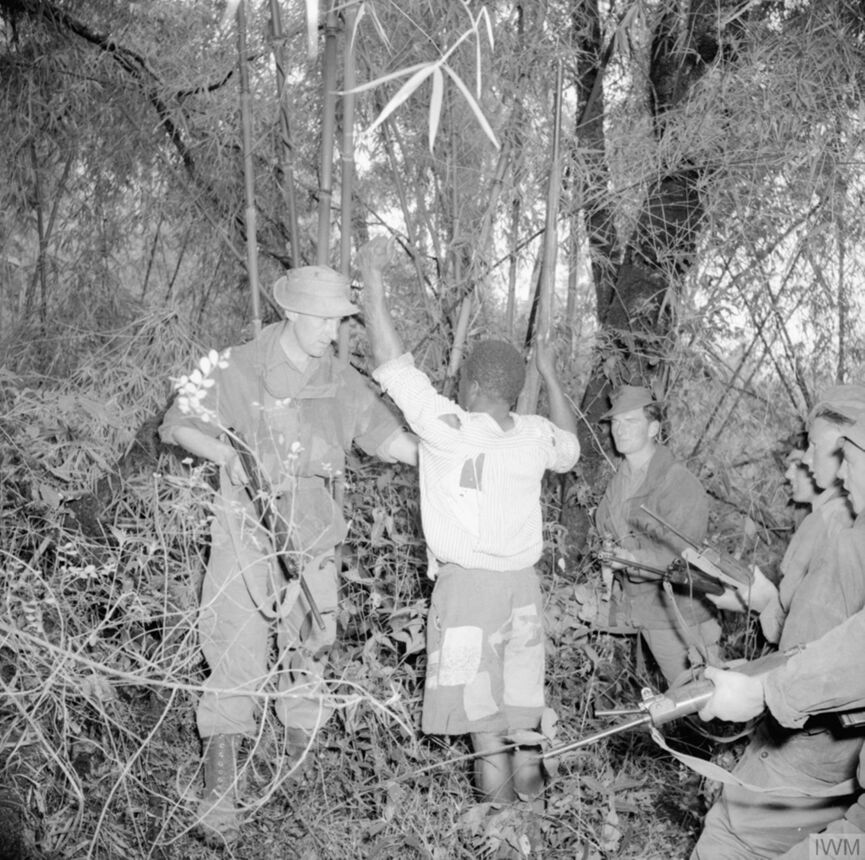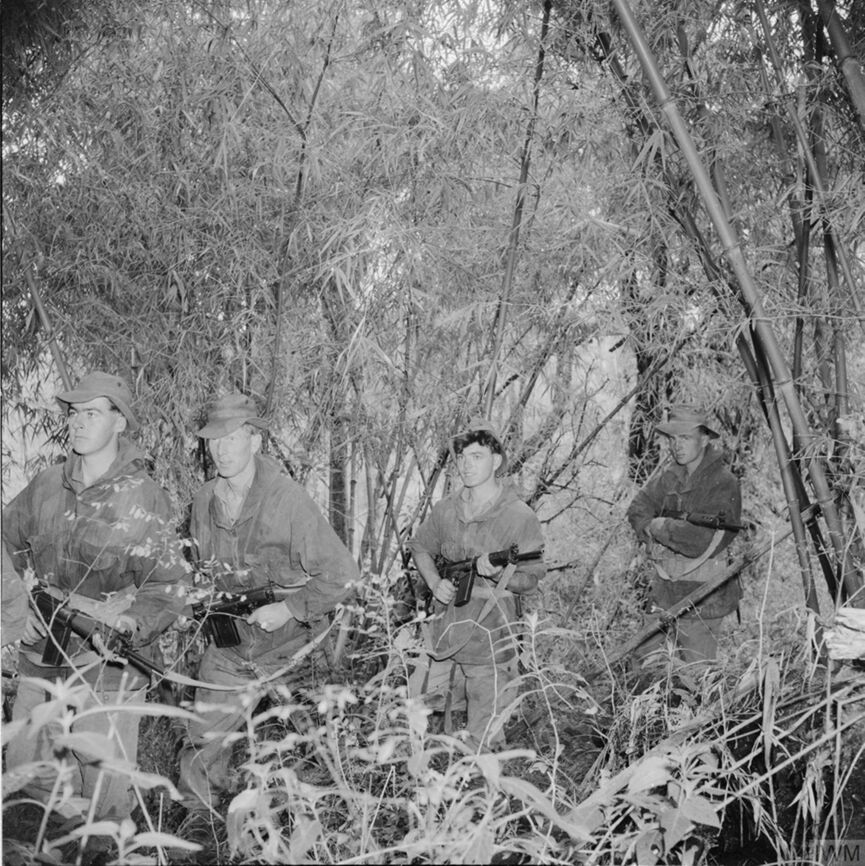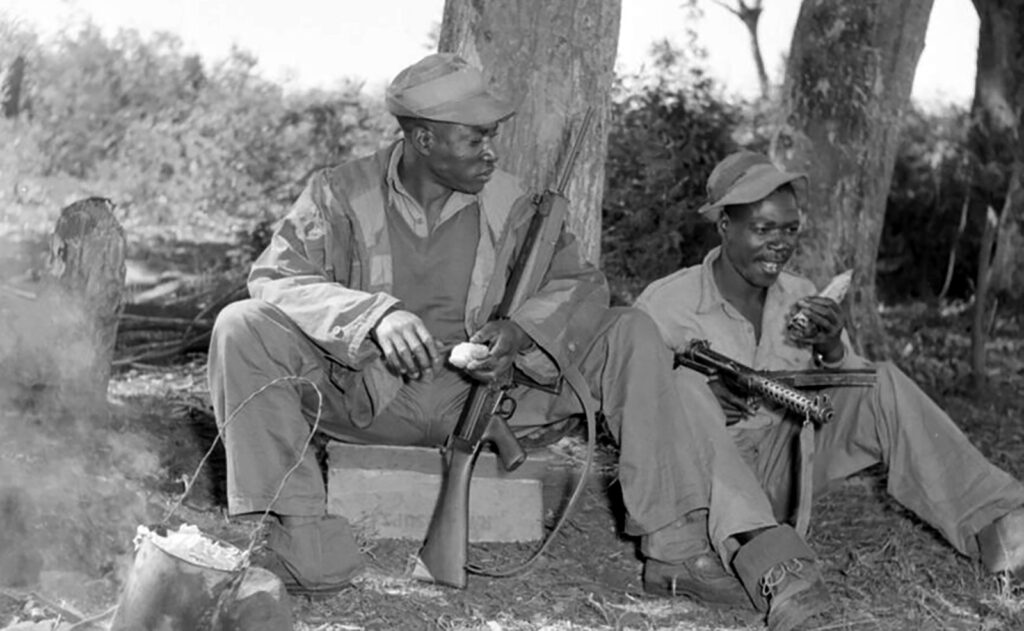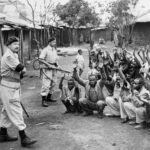Det østafrikanske land Kenya blev bosat af europæere i begyndelsen af det 20. århundrede. Bosætterne koncentrerede sig om det frugtbare centrale højland, hvor de primært dyrkede kaffe og te. De fordrev et stort antal medlemmer af Kikuyu-stammen, som havde dyrket jorden som vandrende landmænd i århundreder.
Da Kenya blev en kronkoloni under den britiske regering i 1920, kunne bosætterne indføre en række restriktioner for jordejerskab og landbrugspraksis for at beskytte deres egne interesser og skubbe kikuyuerne ud. Mange utilfredse kikuyuer blev tvunget væk fra deres traditionelle stammeområder og migrerede til hovedstaden Nairobi.


I begyndelsen af 1950'erne voksede vreden blandt Kikuyu-stammen over den europæiske bosættelse og deres manglende politiske repræsentation. Det kom først til udtryk i angreb, som det forbudte hemmelige selskab Mau Mau udførte i sidste halvdel af 1952 mod regeringsloyale kikuyuer. Mau Mau var stærkt paramilitær og brugte hemmelige ceremonier til at gennemtvinge troskab blandt sine medlemmer og lancerede en kampagne rettet mod europæiske bosættere på deres isolerede gårde. Bevæbnede Mau Mau-grupper dannede skovbander i Aberdare- og Mount Kenya-områderne, hvorfra de dukkede op for at udføre angreb mod civile myndigheder og bosættere. Angrebene tog til, og guvernør Evelyn Baring erklærede undtagelsestilstand i oktober 1952. Ledende medlemmer af Mau Mau-organisationen, herunder den kommende kenyanske præsident Jomo Kenyatta, blev arresteret af myndighederne.
Mau Mau intensiverede deres angreb på europæiske bosættere og kikuyuer, hvilket kulminerede med angrebet på landsbyen Lari i marts 1953, hvor 84 civile kikuyuer, primært kvinder og børn, blev myrdet. Britiske tropper begyndte at forstærke de lokale styrker for at forsøge at imødegå disse angreb. Nationalgarden blev styrket, og man begyndte at indføre sikkerhedsforanstaltninger i Kikuyu-reservatet for at beskytte civile og husdyr.

De britiske militære operationer begyndte at koncentrere sig om de områder, hvor Mau Mau var mest aktiv. De omfattede "Operation Anvil" i Nairobi i april 1954, hvor et stort antal Mau Mau og deres tilhængere blev screenet, arresteret og tilbageholdt. I løbet af 1955 blev der foretaget store udrensninger i Aberdare- og Mount Kenya-områderne. Den britiske efterretning om Mau Mau blev også forbedret med indførelsen af pseudobander, ledet af kikuyu-talende europæere forklædt som afrikanere, som infiltrerede skovbanderne.
Selv om den erklærede undtagelsestilstand skulle fortsætte indtil 1960, ophørte de britiske militæroperationer reelt i november 1955. På det tidspunkt var tusindvis af Mau Mau-medlemmer blevet arresteret, og de havde lidt over 10.000 tab.
Relaterede indlæg
-
Mau Mau-oprøret - et blodigt kapitel i Kenyas historie
Mau Mau-oprøret begyndte i 1952 som en reaktion på ulighed og uretfærdighed i...
-
Den vilde løve Loonkiito, 'en af verdens ældste', dræbt i Kenya
En vild hanløve, som menes at være en af de ældste i verden, har...
-
Nigeria sætter Dangote-raffinaderiet i drift
Nigerias præsident Muhammadu Buhari vil tage Dangote-olieraffinaderiet til flere milliarder dollars i brug om to uger,...


